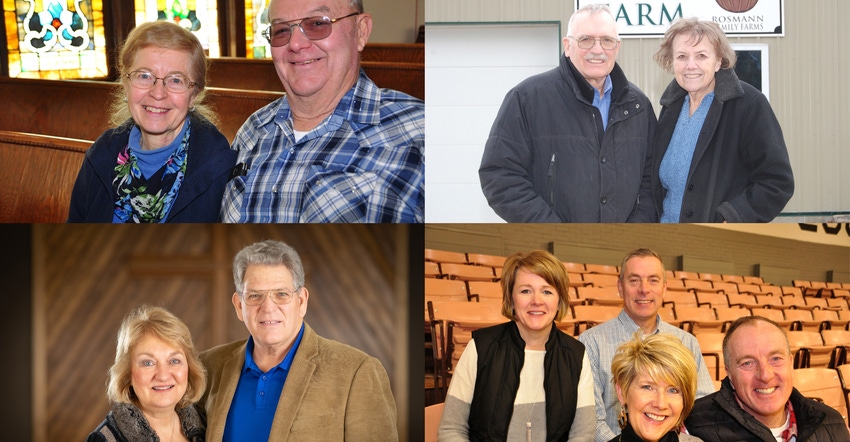
On Sept. 13, four Iowa farm families will be honored as Iowa Master Farmers by Wallaces Farmer, the Iowa Master Farmer Foundation, and the Wallace Centers of Iowa. Since 1926, farmers have been chosen from across the state who exemplify the motto created by Henry A. Wallace: "Good Farming, Clear Thinking, Right Living." This includes not only outstanding management of their farming operations, but also leadership within their community, or in state or national organizations.
Normally, new Master Farmers are honored during a ceremony held in March. However, due to the COVID-19 pandemic, a ceremony was not held in 2020. Instead, the 2020 Iowa Master Farmers will be honored in September this year in Ames. Here's a look at the four 2020 honorees:
Dick and Rita Godfrey
Dick Godfrey grew up around cattle — his grandfather fed cattle, and his dad fed cattle and raised cow-calf pairs on the family farm in Mills County. So, it was a natural step for Dick to get into the cattle business for himself before graduating high school.
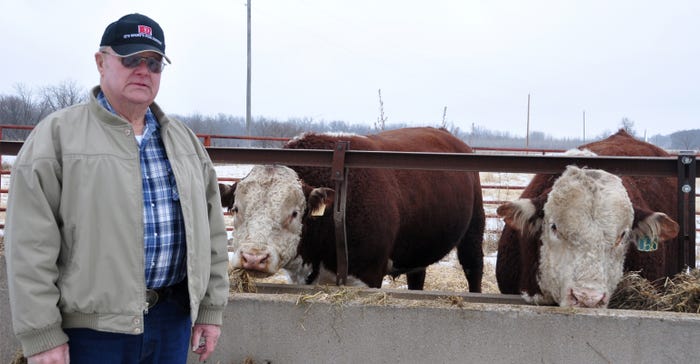 DIck Godfrey
DIck Godfrey

"By the time I got out of college, my herd had paid all my college bills, but the herd was gone," he says. "We were unable to get started until 1980. I worked various jobs in town for about nine years before I came back to the farm."
Dick married his wife Rita in 1971, and they lived in Council Bluffs. There, she worked at the public library and he worked in the proof department of a bank, and then the Soil Conservation Service. Dick later sold real estate for a time before becoming a loan officer for the Federal Land Bank in Red Oak, where they moved in 1975. Dick and Rita rejuvenated and sold a couple of houses while living off the farm, which helped them buy their first line of equipment.
"We were able to rent about 400 acres that first year on crop share; then, we bought some bred gilts and got in the hog business for a number of years. We acquired a few calves here, a few calves there, and eventually had a herd of cattle," Dick says. "It took a while, but we got it done."
They left the hog business in 1993 to return to the homeplace and build the cow herd. The Godfreys breed black cows to Hereford bulls, producing black, white-faced F1-cross calves in the spring and selling them as feeders in the fall.
Dick is serving a two-year term as president of the Iowa Cattlemen’s Association, after which he’ll stay on as past president. He's also given back to the cattle industry locally, regionally and statewide through Mills-Montgomery Cattlemen, and working at the Beef Quarters at the Iowa State Fair.
Dick served on the Iowa 4-H Foundation for seven years, on the board and as president. He has also been a financial supporter of 4-H. His service to 4-H also includes being a member of local 4-H youth committees in two counties, volunteering as beef superintendent at the county fair, judging 4-H record books locally, and reviewing scholarship applications at the state level.
He was active in both Montgomery and Mills County Farm Bureau and was a supporter of Mills County Extension. He has also served on the board of trustees and administrative council at Wesley Chapel, where Rita taught Sunday school for a number of years and is currently active in Bible studies, as well as serving as a pianist and vocalist.
Ron and Maria Rosmann
Before Ron Rosmann came back to the family farm near Harlan, after graduating from Iowa State University in 1973, he initially debated going back to graduate school.
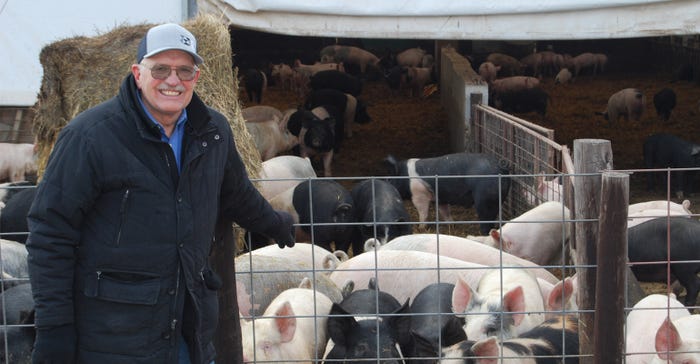 Ron Rosmann
Ron Rosmann

"I didn't know what I wanted to study. I had a bachelor's degree in biology, with double minors in psychology and sociology, and 2.5 years of farm operations experience. I couldn't narrow it down at that point, so I just decided, I'll try farming," Ron says. "It was that, or my dad would have to rent the land out, and that was not something I wanted to see happen — nor did anyone else in the family. I never looked back, although today if I would have had the opportunity, I would have known what I wanted it to study in graduate school — it would be sustainable agriculture."
Ron and his wife, Maria Vakulskas Rosmann, married in 1978. They run a diversified organic crop and livestock farm near Harlan, which includes cow-calf pairs and feeder cattle, farrow-to-finish hogs, laying hens, corn, soybeans and oats. They also grow a mix of wheat, barley and forage field peas called succotash, which is harvested for feed. In addition, they’ve started growing hybrid cereal rye and popcorn.
Ron also farms with two of his sons, Daniel and David. His other son, Mark, works for USDA Foreign Ag Service and is stationed in New Delhi (India).
"My wife does all the marketing for our organic products, while my sons and I do grain marketing. Maria started a store on our farm in 2013 and works with our daughter-in-law, Ellen. They have a distributorship, a food hub in Harlan. She has weekly orders from all of her contacts, which is extensive throughout Iowa and Nebraska. They have a refrigerated truck making deliveries. They also have a restaurant in Harlan, called Milk and Honey. It's been featured on the PBS program “Iowa Ingredient” and is becoming a destination restaurant. It's been there six years already."
As one of the founding members of Practical Farmers of Iowa, the Rosmanns' farm has become a model for sustainable agriculture. Ron served as vice president of the first PFI board in 1986, and has remained active in PFI over the years.
As members of St. Boniface parish north of Harlan, Ron and Maria have been active over the years, writing a book on the history of the church for its 125th anniversary. Next year is the church's 150th anniversary; Ron is in charge of a cultural historical exhibit to commemorate it.
Rick and Jane Juchems
A third-generation farmer, Rick Juchems has always farmed with soil health in mind. In December 1979, after graduating from South Dakota State University, Rick and his wife, Jane, returned to Iowa to farm land owned by Jane's parents. They started with growing corn and soybeans, raising cow-calf pairs and managing a farrow-to-finish hog operation. Today, they're still farming near Plainfield in northeast Iowa. They no longer raise cow-calf pairs, but still raise pigs and custom-feed hogs.
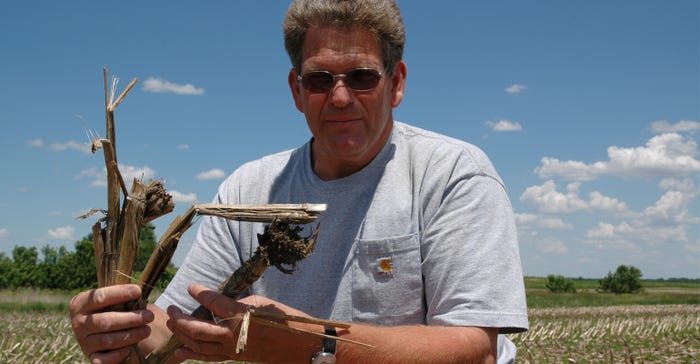 Rick Juchems
Rick Juchems

Rick has been an early adopter of no-till, cover cropping and various conservation practices. He first began putting in structures the 1980s, and put in his first prairie strip about 12 years ago.
"We were pulling anhydrous up and down the hills. I saw where the rain had cut clear down to the bottom of our anhydrous passes. I thought, something's got to change," he says. "That's when we started putting in all kinds of waterways, field borders, prairie strips, buffer strips and terraces."
Rick worked with Iowa Learning Farms to get started in cover crops. In 2014, he began cover cropping 100% of his crop acres. He usually seeds oats into soybeans aerially around the first of September, and seeds cereal rye into corn aerially around the same time.
"Being a soil and water commissioner, I needed to step up to the plate and show people cover crops are a good thing. I help line up the seed to deliver it to the airport, talk with the pilot and get the flight plan scheduled. We've got a solid core of eight to 10 growers that continually put on cover crops," Rick says. "It was growing for a while; we were working with about 20 farmers, flying on cover crop seed. Some haven't continued, but several growers are doing it on their own."
Rick and Jane have two children. Liz Ripley is conservation outreach and cover crop specialist for the Iowa Learning Farms and Water Rocks! programs with Iowa State University Extension, and lives in Ames with her husband, Charles, and their son, Benjamin. Son Nathanial lives and works in Minnesota with his wife, Kristin, and two children, Gabe and Kate.
Rick currently serves on the Soil and Water Commissioner for Butler County; on the Farm Service Agency committee; and on the Iowa Soybean Board, representing District 3. Rick is also chair-elect for St. Paul's Church in Waverly. Jane recently retired from being librarian at Plainfield, and now serves on the committee for the northeast Iowa Community Foundation Board.
Tom and Holly Wagner, Jim and Mimi Wagner
Jim and Tom Wagner always knew they wanted to farm. However, they both took different paths getting their start farming near Primghar in northwest Iowa.
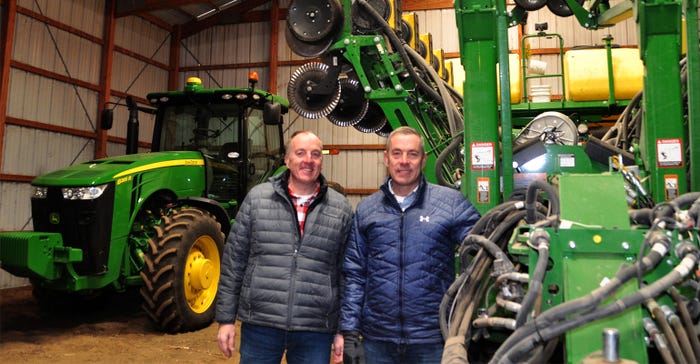 Tom and Jim Wagner
Tom and Jim Wagner

"I was studying at Northwestern College in Orange City. I went for a year and a half, and Dad ruptured a disk in his back. Tom was a sophomore in high school at the time. My mind was in Primghar, not in Orange City. So, I left college and started farming with Dad in 1982," Jim says.
For the next 12 years, Jim farmed with their dad, Bill. In the meantime, Tom attended South Dakota State University in Brookings, S.D., and graduated in 1987. He worked in Omaha, Neb., before moving back home to work as an agronomist at C-S Agrow Service.
"It wasn't really an option for Dad to start us both off at the same time. So, I worked off the farm for nine years," Tom says. "While I was working, Jim and I started farrowing hogs together in 1992. In 1996, Dad retired, and Mom and Dad moved to town, so I started farming full time."
When the time came to upgrade hog facilities in the late 2000s, they changed direction and began custom feeding, cutting back on the labor required while still providing a steady income. In 2006, they began no-tilling and strip tilling, saving time and fuel while also benefiting the soil.
Community plays a big role for Tom and Jim. Tom served on the South O'Brien School Board for eight years and is serving on the board of directors for North West Rural Electric Cooperative.
Jim has reffed high school basketball and football for 42 years, and coached junior high basketball for 27 years. He also serves on the board for Alceco Ag Partners in Albert City, and previously served on the Siouxland Energy board for nine years.
Both have served on the St. Anthony’s Parish Council, worked with FFA over the years, hosted strip till and no-till field days, and helped the Northwest Iowa Research Farm with educational activities.
Jim married Mimi in 1983, and Tom married Holly in 1997. Jim and Mimi have four children: Michael, Scott, Ben and Libby, all graduates of SDSU; and Claire, a high school freshman. Tom and Holly have three children: Garrett and Erin, who are currently at SDSU; and Grant, a high school sophomore.
The brothers don't have a formal agreement, but manage the farm as a true partnership to this day. Both say integrating the next generation into the farming operation will be their biggest challenge.
"Tom worked with my boys when they were getting started, and now I'm working with his boys," Jim says. "We've always done things as a family. Now, I look in the mirror, and I'm 60 and Tom is 56, and we're trying to get the next generation going."
About the Author(s)
You May Also Like






